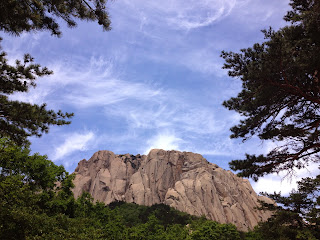Before winter takes full force, here are a few pictures of what I was up to this fall. (If you'd like to enlarge a photo, you may be able to do so by clicking on it.)
* * *
One morning, I woke up and walked the long, foggy road to work. It was nice to pass these flowers that bloom every fall, lining the otherwise dull street with color.

Over the Korean "Thanksgiving" holiday, a couple other foreign teachers and I went and watched the sunrise at Jeongdongjin Beach, which is famous for its view of the sun coming up in the morning.

One Friday, the International Education Department (which I am included in) at school went out for a hike up Samaksan in Chuncheon. Pictured immediately below are one of the older English teacher's wives (who was a faster and more skilled hiker than any of us!), myself, the native Japanese teacher, and one of the two native Chinese teachers. The view from the top was outstanding.
After watching an open class one afternoon, our district's Korean coordinator took a few of us to the local white porcelain museum for a (guided) pottery making experience.


One weekend, I went to watch a ping pong (or should I say table tennis?) competition at the facility where I've recently begun taking lessons. I guess this is the speed I'm working toward...
I've continued to be involved with the local radio (well, podcast) program and recently found a few new people willing to participate, too.


This is a meal at one of my favourite Korean restaurants: grilled, seasoned chicken with soybean paste stew, green onion "salad," rice, and giant-radish kimchi.

A couple weekends ago, a few friends and I rented a car and went to the beach (again). This is a little, old-fashioned rest stop on the way. I'm holding a bag of puffed rice "crackers" that I bought to snack on. The word up top means "welcome." It was a cloudy, wet day, but we enjoyed watching the waves out a seaside cafe window.
* * *
The weather was nice this fall, which made it easier to be a bit more active. The winter cold is coming quickly now, though, so I expect it'll soon take more intention to get out.
* * *
Thanks for reading :)











































